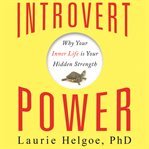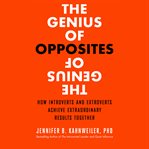Review by New York Times Review
MY neighbor, a leadership development consultant who regularly helps people improve themselves through personality tests like the Myers-Briggs Type Indicator, once told me I was the most introverted person he'd ever met. I took this as a compliment. Who wouldn't? The introverts who are the subject of Susan Cain's new book, "Quiet," don't experience their inwardness in quite so self-congratulatory a way. They and others view their tendency toward solitary activity, quiet reflection and reserve as "a second-class personality trait, somewhere between a disappointment and a pathology," Cain writes. Too often denigrated and frequently overlooked in a society that's held in thrall to an "Extrovert Ideal - the omnipresent belief that the ideal self is gregarious, alpha and comfortable in the spotlight," Cain's introverts are overwhelmed by the social demands thrust upon them. They're also underwhelmed by the example set by the voluble, socially successful go-getters in their midst who "speak without thinking," in the words of a Chinese software engineer whom Cain encounters in Cupertino, Calif., the majority Asian-American enclave that she suggests is the introversion capital of the United States. Many of the self-avowed introverts she meets in the course of this book, which combines on-the-scenes reporting with a wide range of social science research and a fair bit of "quiet power" cheerleading, ape extroversion. Though some fake it well enough to make it, going along to get along in a country that rewards the outgoing, something precious, the au-thor says, is lost in this masquerade. Unchecked extroversion - a personality trait Cain ties to ebullience, excitability, dominance, risk-taking, thick skin, boldness and a tendency toward quick thinking and thoughtless action - has actually, she argues, come to pose a real menace of late. The outsize reward-seeking tendencies of the hopelessly outer-directed helped bring us the bank meltdown of 2008 as well as disasters like Enron, she claims. With our economy now in ruins, Cain writes, it's time to establish "a greater balance of power" between those who rush to speak and do and those who sit back and think. Introverts - who, according to Cain, can count among their many virtues the fact that "they're relatively immune to the lures of wealth and fame" - must learn to "embrace the power of quiet." And extroverts should learn to sit down and shut up. Introverts may be an odd audience for a book about power and leadership - concepts that necessarily involve the tiring and unappealing prospect of having power over, and leadership of, other people. Jonathan Rauch, a contributing editor at National Journal, tapped into the inherent humor of this contradiction some years ago, when he wrote a much-read meditation in The Atlantic on introversion. Rauch dreamed about the dawning of an "Introverts' Rights movement," the slogan of which might someday be "Please shush." He got the tone just right: "Remember, someone you know, respect and interact with every day is an introvert, and you are probably driving this person nuts." "Quiet," a long and ploddingly earnest book, would have greatly benefited from some of this levity. But for Cain, the perils of introversion are no laughing matter. Her interest in writing on the subject, she relates, stemmed from her own agonizing difficulties with public speaking - an aversion to putting herself "out there," which made Harvard Law School such a trial that she once threw up on the way to class. Her Cupertino "introverts" (who, I think, are probably better understood as sharing a cultural background rather than a near-universal personality trait) feel unappreciated, undervalued, resentful of their extroverted (and non-Asian) fellow students and colleagues who noisily "talk nonsense," as a Taiwanese-born Cupertino woman puts it, and still get ahead. Her "extroverts" are, often enough, obnoxious fools: Stanford students stripping naked and running down a San Francisco street as part of a freshman "icebreaking" event; a charismatic self-help guru, raking in the dough as he flashes his too-white teeth and sells the secrets of his success to the constitutionally less exuberant. It would be easy to blame people like this for the decline of our civilization if they were, in fact, typical. But, of course, they aren't. Cain, who left a career in corporate law and consulting for a quieter life of writing at home with her family, is at her best on the subject of children. Her accounts of introverted kids misunderstood and mishandled by their parents should give pause, for she rightly notes that introversion in children (often incorrectly viewed as shyness) is in some ways threatening to the adults around them. Indeed, in an age when kids are increasingly herded into classroom "pods" for group work, Cain's insights into the stresses of nonstop socializing for some children are welcome; her advice that parents should choose to view their introverted offspring's social style with understanding rather than fear is well worth hearing. However useful and astute her observations and advice regarding introverted kids, though, Cain's book is about adults, and on this population, unfortunately, she's a whole lot less convincing. For one thing, her definition of introversion - a temperamental inner-directedness first identified as a core personality trait by Carl Jung in 1921 - widens constantly; by the end of the book, it has expanded to include all who are "reflective, cerebral, bookish, unassuming, sensitive, thoughtful, serious, contemplative, subtle, introspective, inner-directed, gentle, calm, modest, solitude-seeking, shy, risk-averse, thin-skinned." This widening of the definition makes introversion so broad a category, including, basically, all that is wise and good, that it's largely meaningless, except as yet another vehicle for promoting self-esteem: "a very empowering lens through which to view your personality," as Cain puts it. Another problem with Cain's argument is her assumption that most introverts are actually suffering in their self-esteem. This may be true in the sorts of environments - Harvard Business School, corporate boardrooms, executive suites - that she knows best and appears to spend most of her time thinking about. Had she spent more time in other sorts of places, among other types of people - in research laboratories, for example, or among economists rather than businessmen and women - she would undoubtedly have discovered a world of introverts quite contented with who they are, and who feel that the world has been good to them. The need to dress up any exploration of a social or psychological phenomenon in go-go language, making interesting observations or reflections the basis for something like a new social movement ("Introverts of the World, Unite!" as The Atlantic headlined a follow-up interview with Rauch), is particularly American, and can be as noisily grating as the compulsory extroversion Cain deplores. "Quiet" is full of gratuitous sloganeering: "Love is essential; gregariousness is optional." "The secret to life is to put yourself in the right lighting." Such writing offsets Cain's serious research rather badly. A more quiet argument would have been much more effective. Introverts must learn to 'embrace the power of quiet.' And extroverts should learn to sit down and shut up. Judith Warner is the author, most recently, of "We've Got Issues: Children and Parents in the Age of Medication."
Copyright (c) The New York Times Company [February 5, 2012]
Review by Booklist Review
It's hard to believe, in this world of social media and reality TV, that one-third to one-half of Americans are introverts. Yet being an introvert has become a social stigma. The rise of what the author dubs the Extrovert Ideal (in which the ideal self is gregarious, alpha, and comfortable in the spotlight) began with Dale Carnegie and his wildly popular self-help books. Simultaneously, we saw the rise of the movie star and of personality-driven ads and the appearance of the inferiority complex, developed by psychologist Alfred Adler. Today, pitchmen like Tony Robbins sell the idea of extroversion as the key to greatness. But and this is key to the author's thesis personal space and privacy are absolutely vital to creativity and invention, as is freedom from peer pressure. Cain also explores the fundamental differences in psychology and physiology between extroverts and introverts, showing how being an introvert or an extrovert is really a biological imperative. No slick self-help book, this is an intelligent and often surprising look at what makes us who we are.--Pitt, David Copyright 2010 Booklist
From Booklist, Copyright (c) American Library Association. Used with permission.
Review by Publisher's Weekly Review
While American culture and business tend to be dominated by extroverts, business consultant Cain explores and champions the one-third to one-half of the population who are introverts. She defines the term broadly, including "solitude-seeking" and "contemplative," but also "sensitive," "humble," and "risk-averse." Such individuals, she claims (though with insufficient evidence), are "disproportionately represented among the ranks of the spectacularly creative." Yet the American school and workplace make it difficult for those who draw strength from solitary musing by over-emphasizing teamwork and what she calls "the new Groupthink." Cain gives excellent portraits of a number of introverts and shatters misconceptions. For example, she notes, introverts can negotiate as well as, or better than, alpha males and females because they can take a firm stand "without inflaming [their] counterpart's ego." Cain provides tips to parents and teachers of children who are introverted or seem socially awkward and isolated. She suggests, for instance, exposing them gradually to new experiences that are otherwise overstimulating. Cain consistently holds the reader's interest by presenting individual profiles, looking at places dominated by extroverts (Harvard Business School) and introverts (a West Coast retreat center), and reporting on the latest studies. Her diligence, research, and passion for this important topic has richly paid off. (Jan.) (c) Copyright PWxyz, LLC. All rights reserved.
(c) Copyright PWxyz, LLC. All rights reserved
Review by Library Journal Review
The introvert/extrovert dichotomy is easily stereotyped in psychological literature: extroverts are buoyant and loud, introverts are shy and nerdy. Here, former corporate lawyer and negotiations consultant Cain gives a more nuanced portrait of introversion. Introverts are by nature more pensive, quiet, and solitary, but they can also act extroverted for the pursuit of their passions. Cain describes and explicates the introvert personality by citing much research (at times so much that readers may be confused about what she is explaining) and going undercover, at one point immersing herself at a Harvard Business School student center and, in a very amusing chapter, at a Tony Robbins seminar, among other case studies. Cain's conclusion is that the introversion or extroversion personality trait is not as simple as an on/off switch but a much more complex expression of a personality. VERDICT This book is a pleasure to read and will make introverts and extroverts alike think twice about the best ways to be themselves and interact with differing personality types. Recommended to all readers.-Maryse Breton, Bibliotheque et Archives nationales du Quebec, Montreal (c) Copyright 2012. Library Journals LLC, a wholly owned subsidiary of Media Source, Inc. No redistribution permitted.
(c) Copyright Library Journals LLC, a wholly owned subsidiary of Media Source, Inc. No redistribution permitted.
Review by Kirkus Book Review
Jersey Shore narcissism and American Idol fame really be inhabited by reserved, sensitive types? According to Cain, yes--and we better start valuing their insight. Extroverts have their place, but things can quickly go haywire when we start confusing assertiveness with competence--the economic meltdown on Wall Street was the most stunning recent example. Had there been a few more conscientious, contemplative introverts in the boardroom (and had they made themselves heard), Cain writes, the country's fortunes would now be decidedly different. But today's prevailing susceptibility to "reward sensitivity," as embodied by alpha-dog Wall Street types, wasn't always the norm. Cain provides fascinating insight into how the United States shifted from an introvert-leaning "cult of character" to an extrovert-leaning "cult of personality" ruled by the larger-than-life Tony Robbinses of the world. Readers will learn that the tendency for some to be reserved is actually hardwired, and as every evolutionary biologist will tell you, innate characteristics are there for a reason--to help humans survive and thrive. The author also boldly tackles introverts themselves, as well as the ambivalence many often feel about being relegated to the corner. "Stick to your guns," writes fellow introvert Cain. The author's insights are so rich that she could pen two separate books: one about parenting an introverted child, and another about how to make an introvert/extrovert relationship work. An intriguing and potentially life-altering examination of the human psyche that is sure to benefit both introverts and extroverts alike.]] Copyright Kirkus Reviews, used with permission.
Copyright (c) Kirkus Reviews, used with permission.



